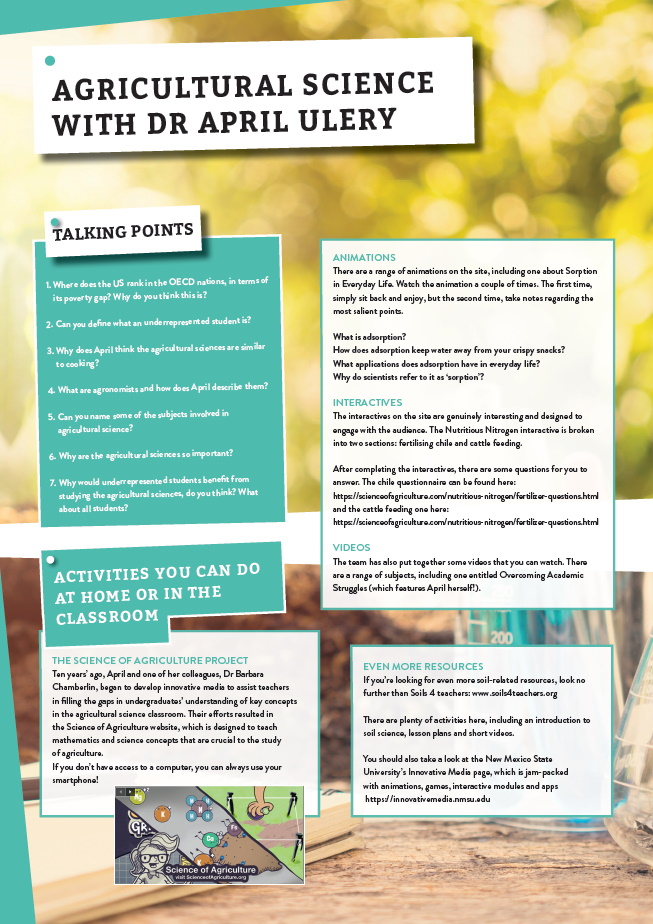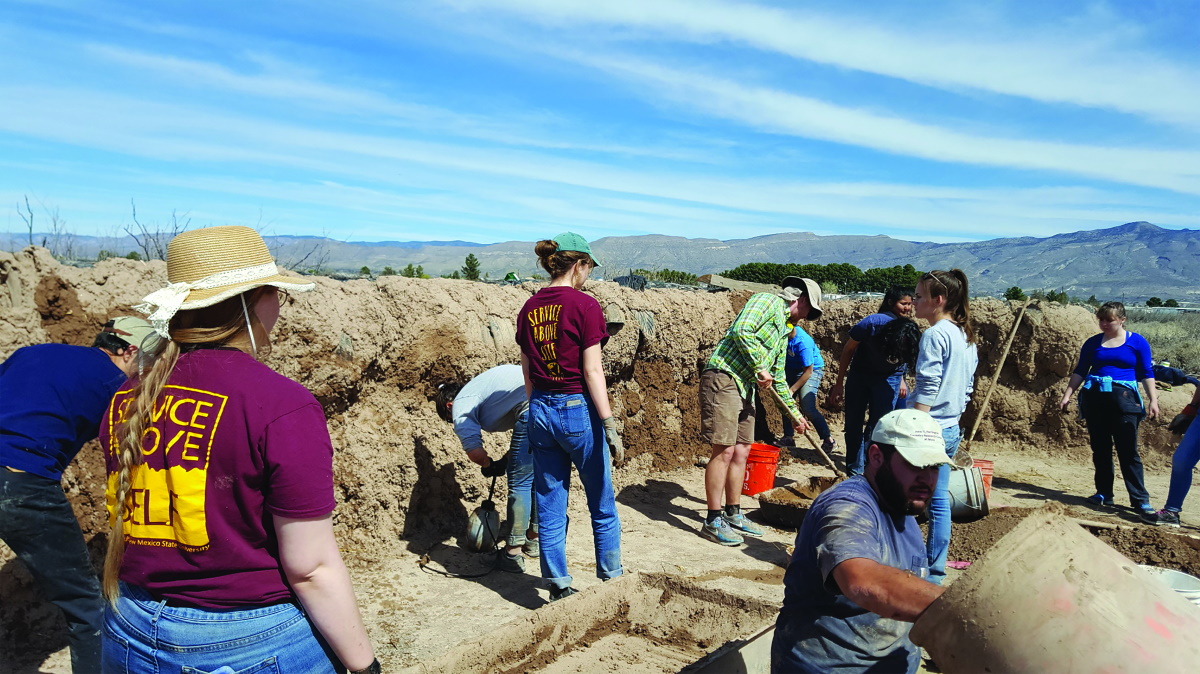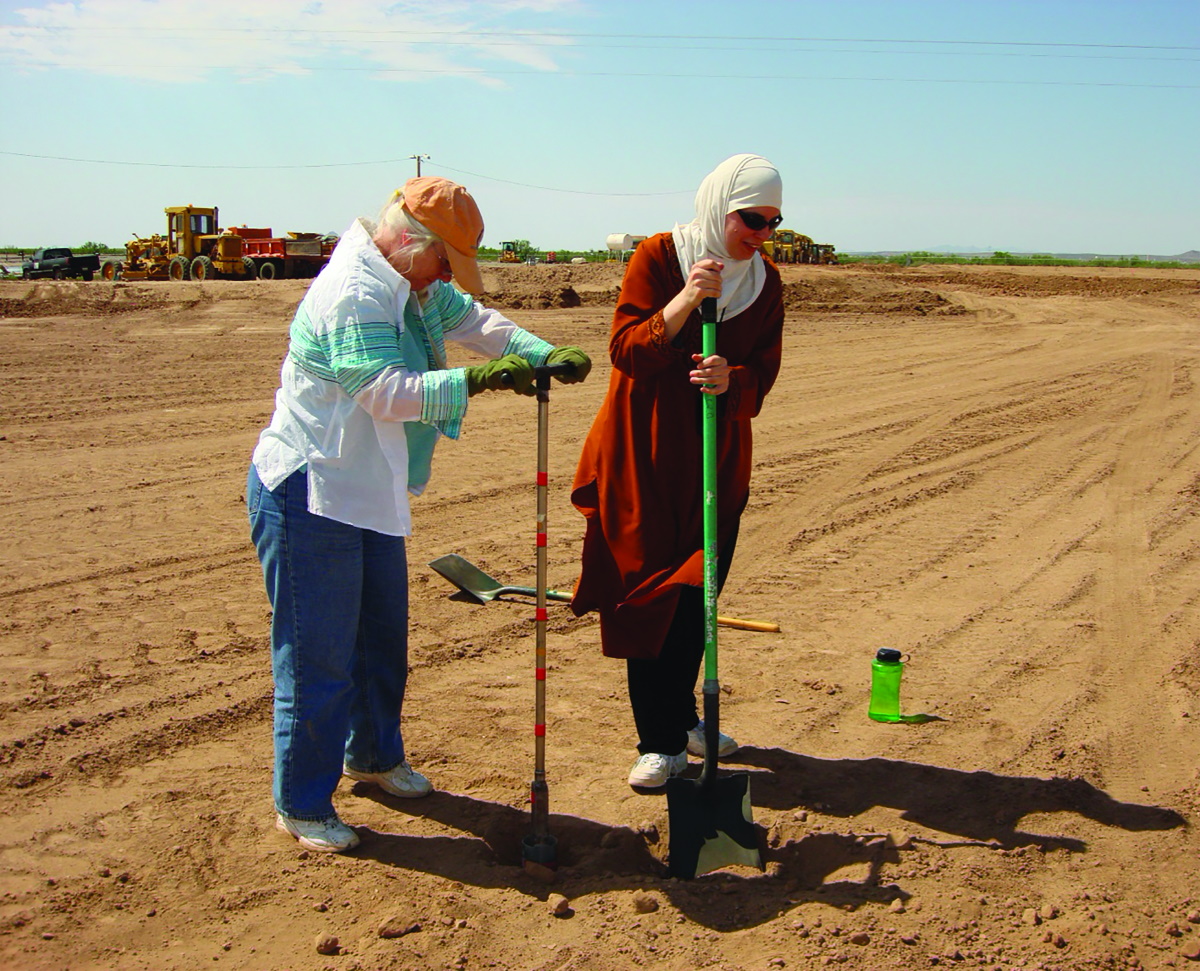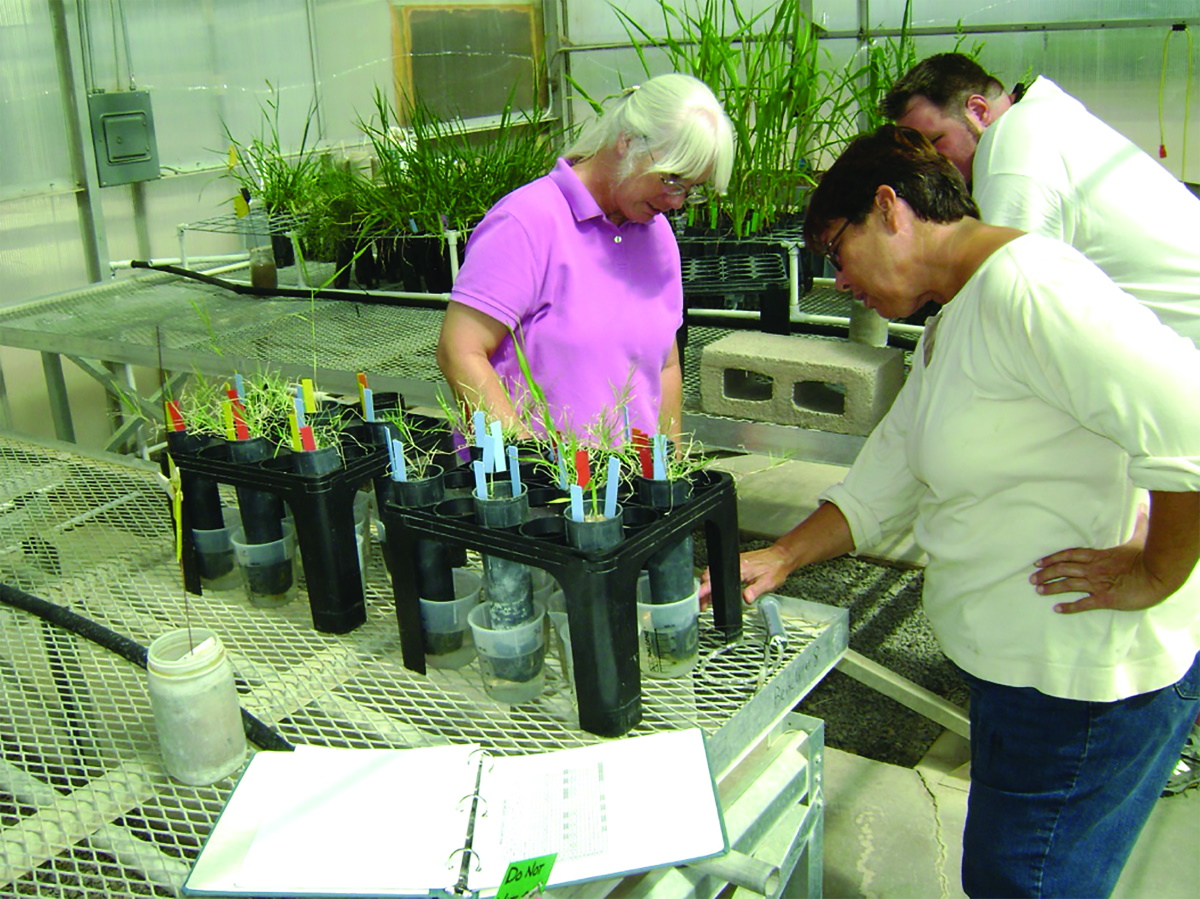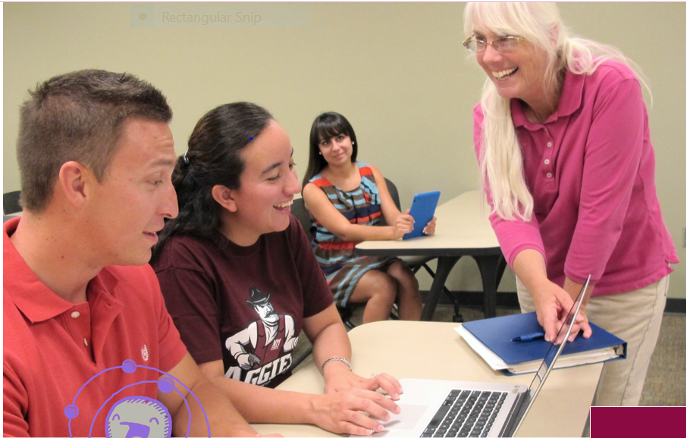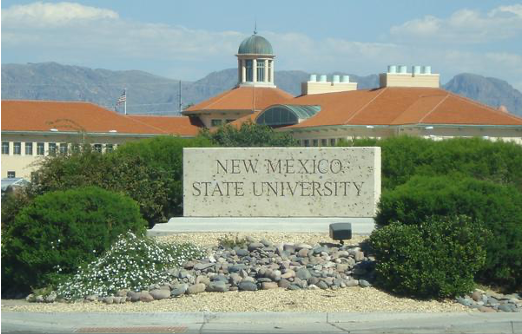Can the agricultural sciences tackle inequality?
Dr April Ulery is based at New Mexico State University in the US and leads the ‘Raising the Gates’ project. The aim of this initiative is to give underrepresented students the skills they need to succeed in the agricultural sciences
According to the Organisation for Economic Co-operation and Development (OECD), only Luxembourg spends more than the US on education. However, the US also ranks 5th from bottom among OECD nations in terms of its poverty gap. This has resulted in large numbers of students failing to have the mathematics and chemistry knowledge that is often required to embark on an academic career in the sciences.
Of course, there are many complex reasons for students having gaps in their knowledge and not all of the issues are related to poverty (although many are). Students from traditionally underrepresented groups, such as racial/ethnic minorities, first-generation college students, LGBTQ+ students, students with disabilities and students from lower socio-economic households, often face unique challenges that can make studying more difficult. For instance, the state of New Mexico is a ‘minority majority’ state, meaning that Hispanics and native Americans outnumber the non-Hispanic white population, but students from these groups are likely to have been raised with fewer monetary resources.
Many Hispanic students come from families that still speak Spanish at home, and may be the first members of their family to attend college. This can result in families not knowing how best to support their children or how expectations in college differ from those in elementary and high school. Then there is the fact that underrepresented students often do more hours of paid work per week in addition to going to school – this can make it more difficult to take part in extra-curricular activities, get additional tutoring or join clubs.
Complicating all of these factors, many students graduate from high school without having mastered reading, writing and numeracy at the level expected by many college professors. So, for these students to be expected to already have a firm grasp of chemistry, biology, mathematics and other scientific subjects is often unrealistic. Dr April Ulery, based at New Mexico State University (NMSU), leads a team in ‘Raising the Gates’, with the aim of helping underrepresented students master key foundational concepts in mathematics and chemistry as a precursor to upper level work in various fields. As a soil scientist, April is passionate about helping students successfully complete their studies in the agricultural sciences.
WHY ARE MATHEMATICS AND CHEMISTRY SO IMPORTANT TO THE STUDY OF AGRICULTURAL SCIENCES?
Agriculture can be thought of as similar in principle to cooking, at least in terms of reactions and changes from one form or state to another. April explains, “Plant growth requires nutrients in certain amounts and forms, and agronomists (a fancy word for anyone working on crop production and soil management) need to be able to measure those nutrients and calculate how much is available to plants.” Understanding these processes is important. “There will always be employees who just follow instructions, just like some people who simply follow a recipe, but they won’t know how to ‘trouble-shoot’ when something goes wrong or improvise if they are missing something.”
CAN STUDENTS STILL STUDY AGRICULTURAL SCIENCES IF MATHEMATICS AND CHEMISTRY ARE NOT THEIR STRONG POINTS?
Yes, of course! There are many fields of agricultural science and a wide variety of jobs that require various kinds of knowledge. What April and her team want to emphasise is that agriculture is based in science, and if you want to work within the field, you should be aware of the science, even if you are not a chemist or mathematician. Many students involved in Raising the Gates may only go as far as basic chemistry and mathematics – it is all about having enough of a grasp of the subjects to use them as and when required. A little knowledge can go a long way and who knows – perhaps an introduction to the subjects could spark an interest that leads to a new career path!
WHAT TENDS TO HAPPEN WHEN STUDENTS FAIL TO CLOSE GAPS IN THEIR MATHEMATICS AND CHEMISTRY KNOWLEDGE?
The poverty gap in the US means that the separation between those who get what they need and those who don’t is expanding. NMSU’s Raising the Gates project is an attempt to ‘level the playing field’ by offering online learning tools that everyone can access. “There is still a problem that underrepresented students are less likely to have personal computers they can use to go online and use digital learning tools,” says April. “We often mistakenly believe that today’s students are computer savvy, but as teachers, we have to spend time with them navigating the massive amounts of information available to them on the internet.”
The goals of the Raising the Gates project have now been completed, and more than fifteen educational resources have been made available online for free. It’s important to stress that most of these resources can also be accessed via smartphones, which makes it easier for students who might not have ready access to a computer. Moreover, the team continues to create educational materials through other initiatives, so keep checking www.scienceofagriculture.com for new information.
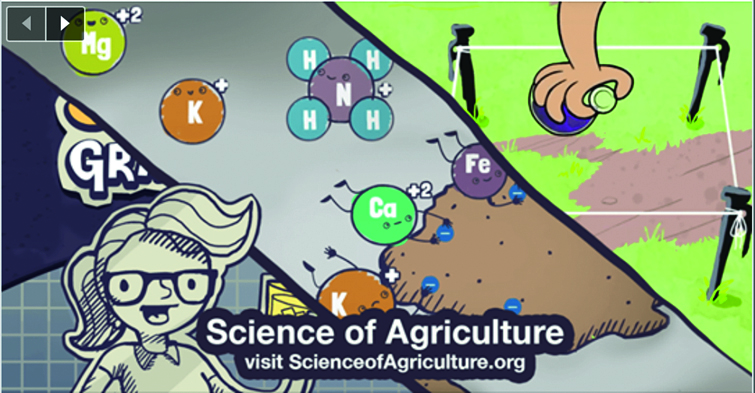
Reference
https://doi.org/10.33424/FUTURUM55
,According to the Organisation for Economic Co-operation and Development (OECD), only Luxembourg spends more than the US on education. However, the US also ranks 5th from bottom among OECD nations in terms of its poverty gap. This has resulted in large numbers of students failing to have the mathematics and chemistry knowledge that is often required to embark on an academic career in the sciences.
Of course, there are many complex reasons for students having gaps in their knowledge and not all of the issues are related to poverty (although many are). Students from traditionally underrepresented groups, such as racial/ethnic minorities, first-generation college students, LGBTQ+ students, students with disabilities and students from lower socio-economic households, often face unique challenges that can make studying more difficult. For instance, the state of New Mexico is a ‘minority majority’ state, meaning that Hispanics and native Americans outnumber the non-Hispanic white population, but students from these groups are likely to have been raised with fewer monetary resources.
Many Hispanic students come from families that still speak Spanish at home, and may be the first members of their family to attend college. This can result in families not knowing how best to support their children or how expectations in college differ from those in elementary and high school. Then there is the fact that underrepresented students often do more hours of paid work per week in addition to going to school – this can make it more difficult to take part in extra-curricular activities, get additional tutoring or join clubs.
Complicating all of these factors, many students graduate from high school without having mastered reading, writing and numeracy at the level expected by many college professors. So, for these students to be expected to already have a firm grasp of chemistry, biology, mathematics and other scientific subjects is often unrealistic. Dr April Ulery, based at New Mexico State University (NMSU), leads a team in “Raising the Gates”, with the aim of helping underrepresented students master key foundational concepts in mathematics and chemistry as a precursor to upper level work in various fields. As a soil scientist, April is passionate about helping students successfully complete their studies in the agricultural sciences.
WHY ARE MATHEMATICS AND CHEMISTRY SO IMPORTANT TO THE STUDY OF AGRICULTURAL SCIENCES?
Agriculture can be thought of as similar in principle to cooking, at least in terms of reactions and changes from one form or state to another. April explains: “Plant growth requires nutrients in certain amounts and forms, and agronomists (a fancy word for anyone working on crop production and soil management) need to be able to measure those nutrients and calculate how much is available to plants.” Understanding these processes is important. “There will always be employees who just follow instructions, just like some people who simply follow a recipe, but they won’t know how to ‘trouble-shoot’ when something goes wrong or improvise if they are missing something.”
CAN STUDENTS STILL STUDY AGRICULTURAL SCIENCES IF MATHEMATICS AND CHEMISTRY ARE NOT THEIR STRONG POINTS?
Yes, of course! There are many fields of agricultural science and a wide variety of jobs that require various kinds of knowledge. What April and her team want to emphasise is that agriculture is based in science, and if you want to work within the field, you should be aware of the science, even if you are not a chemist or mathematician. Many students involved in Raising the Gates may only go as far as basic chemistry and mathematics – it is all about having enough of a grasp of the subjects to use them as and when required. A little knowledge can go a long way and who knows – perhaps an introduction to the subjects could spark an interest that leads to a new career path!
WHAT TENDS TO HAPPEN WHEN STUDENTS FAIL TO CLOSE GAPS IN THEIR MATHEMATICS AND CHEMISTRY KNOWLEDGE?
The poverty gap in the US means that the separation between those who get what they need and those who don’t is expanding. NMSU’s Raising the Gates project is an attempt to ‘level the playing field’ by offering online learning tools that everyone can access. “There is still a problem that underrepresented students are less likely to have personal computers they can use to go online and use digital learning tools,” says April. “We often mistakenly believe that today’s students are computer savvy, but as teachers, we have to spend time with them navigating the massive amounts of information available to them on the internet.”
The goals of the Raising the Gates project have now been completed, and more than fifteen educational resources have been made
available online for free. It’s important to stress that most of these resources can also be accessed via smartphones, which makes it easier for students who might not have ready access to a computer. Moreover, the team continues to create educational materials through other initiatives, so keep checking www.scienceofagriculture.com for new information.

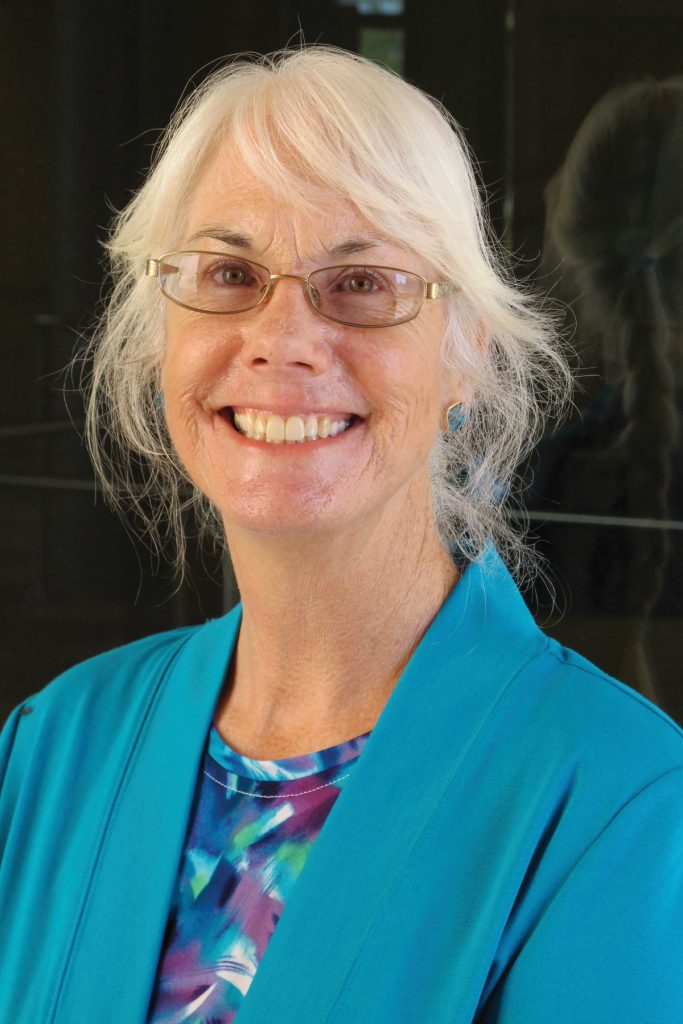 DR APRIL ULERY
DR APRIL ULERY
Department of Plant and Environmental Sciences, College of Agricultural, Consumer and Environmental Sciences, New Mexico State University, USA.
FIELD OF RESEARCH: Soil Science
RESEARCH PROJECT: April’s project, Raising the Gates, is designed to help under-represented students understand key concepts in mathematics and chemistry so that they can successfully complete their undergraduate studies in agricultural sciences.
FUNDERS: USDA Hispanic Serving Institution program 2014-38422-22089, 201038422-21211; New Mexico State University, including the President’s Fund: National Institute of Food and Agriculture.
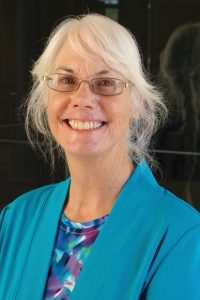 DR APRIL ULERY
DR APRIL ULERY
Department of Plant and Environmental Sciences, College of Agricultural, Consumer and Environmental Sciences, New Mexico State University, USA.
FIELD OF RESEARCH: Soil Science
RESEARCH PROJECT: April’s project, Raising the Gates, is designed to help under-represented students understand key concepts in mathematics and chemistry so that they can successfully complete their undergraduate studies in agricultural sciences.
FUNDERS: USDA Hispanic Serving Institution program 2014-38422-22089, 201038422-21211; New Mexico State University, including the President’s Fund: National Institute of Food and Agriculture.
MEET SKYLER STINSON
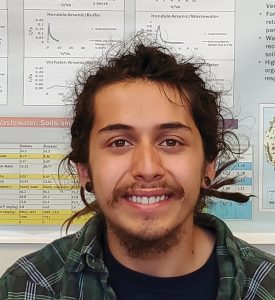 Skyler Stinson has benefited from resources such as the Science of Agriculture website that April and the NMSU team have put together.
Skyler Stinson has benefited from resources such as the Science of Agriculture website that April and the NMSU team have put together.
Skyler was good at mathematics in elementary school, but became distracted during his middle school years, like so many students, when it was more fun to hang out with friends than to study. Fortunately, his high school guidance counsellor helped him refocus his energies on college and his career. Because he had always loved plants and the outdoors, Skyler majored in biology, since the college he first attended, the University of New Mexico (UNM), did not have a plant science major. His mathematics background was strong enough so that he only needed one course in algebra, and he was able to enrol in chemistry.
He found chemistry interesting but very challenging. However, UNM has a programme designed to help students who are having difficulties with the subject, so he was allowed to participate in an introductory chemistry class during the second half of the semester, without losing his place in the lab section. This was enormously helpful and Skyler quickly realised how interesting and useful chemistry could be. His study habits improved and he used resources such as Khan Academy videos on YouTube as well as the Science of Agriculture website.
Skyler transferred from UNM to New Mexico State University (NMSU) to major in Horticulture (the art or practice of garden cultivation and management). “Studying plants is fascinating because you get to see all the stages of life from the seed to final product,” explains Skyler. “The beauty of microorganisms like zoospores and mycelium is delightful to see and I now have a ‘big picture’ view of how everything is connected and works together in natural ecosystems.”
Skyler’s story is truly inspirational and shows how hard work, coupled with useful resources such as those NMSU has created, can help students realise their academic dreams and career ambitions.
ABOUT THE AGRICULTURAL SCIENCES
Agricultural science deals with plant and animal production and processing. Studies are focused on a wide range of topics, including technologies associated with soil and crop cultivation, harvesting, animal production and how to process plant and animal products for human consumption. Good agricultural scientists are also good resource managers – helping to protect the soil, water and atmosphere.
WHY IS IT IMPORTANT TO STUDY AGRICULTURAL SCIENCES?
Given that food is one of the most basic human needs, the agricultural sciences are of particular importance, as they help us to develop an understanding of the best methods for feeding and clothing the world. “Being a plant, soil or animal scientist doesn’t necessarily mean you’re a farmer or rancher – another misconception by many underrepresented students’ families who think that the only job for them is as a field labourer,” explains April. “Jobs in agricultural sciences include support for research, food security, and improving or protecting the natural resources.”
WHAT CAN STUDENTS GAIN FROM STUDYING THESE SUBJECTS?
The interdisciplinary nature of agricultural science means that students in this field will benefit from developing an understanding in a broad range of subjects, including biology, chemistry, physics, mathematics, economics, health and behavioural issues, and the environment. “By studying agriculture, whether it be plant or animal sciences, students are learning about how everything cycles in nature and the various phases of life from creation, growth, transformation and death – all to be recycled and to start again,” says April. “The fun part about studying plants and animals is that you already have a close connection to the subject – many students get into these majors because they want to raise animals, or garden to grow plants.”
ARE THERE ARE ANY GLOBAL OR NATIONAL ISSUES THAT COULD BE ADDRESSED BY AGRICULTURAL SCIENTISTS?
Yes! As the global population continues to grow, the need to produce enough plant- and animal-based food will become increasingly urgent. Global warming and climate change are also presenting challenges, including less water and farmable land, and the fact that plants can absorb carbon dioxide from the atmosphere is another opportunity that agricultural scientists could use to help improve the environment.
HOW TO BECOME AN AGRICULTURAL SCIENTIST
• April is President-elect of the Soil Science Society of America, which is a great source of information on potential careers and starting out: https://www.soils.org/careers
• April firmly believes there are lots of opportunities in agricultural sciences in the US. She says, “New crops such as hemp and alternative crops used for biofuels have created jobs in the ‘Ag Production’ sector. Many of our students become crop consultants, golf course managers, teachers, and scientists in large international companies.”
• Agricultural scientists can earn anywhere between $56,000 and $87,000, depending on the qualifications and experience gained.
To become an agricultural scientist, you should try to take as many science courses as possible, particularly chemistry and biology. Algebra will be useful and, if possible, study trigonometry, as this will help you to understand spatial relationships. Calculus is also helpful, particularly if you’re considering graduate school and a career in research.
HOW DID DR APRIL ULERY BECOME AN AGRICULTURAL SCIENTIST?
WHAT DID YOU IMAGINE YOURSELF DOING WHEN YOU YOUNGER?
I had planned to go into the social sciences – I wanted to do something to help underserved populations, but never thought of myself as a ‘scientist’ – more like a counsellor. To be honest, I was just a typical kid who wanted to have fun and be popular, but parental and teacher expectations made me want to do well and maintain good grades. Attending college was ALWAYS expected of me and not finishing was never an option. Part of that was my own determination and part was the support I received from my parents – both of whom were college graduates.
WERE YOU ANY GOOD AT MATHEMATICS AND CHEMISTRY AT SCHOOL?
Yes, but I was lazy and didn’t really learn the subjects as much as memorise my way through them! That came back to bite me when I got into difficult classes where I had to work hard to understand (and eventually teach) the concepts. I’m also disappointed that my schools didn’t have science fairs and other opportunities to work with mentors and college students. Even today, I suffer from ‘imposter syndrome’, which is very prevalent in women and under-represented minorities!
YOU HAVE A DEGREE IN GEOLOGY. WHO OR WHAT DREW YOU TO THIS SUBJECT?
To be honest I took my first geology class because my boyfriend was majoring in geology and he encouraged me to take it so that I could enrol in a six-week summer field class in Hawaii. What happened was that I fell in love with the Earth! Geology and chemistry and even math were so much fun once I had a reason to learn them. Geology is so logical and allowed me to combine my analytical tendencies, artistic abilities, and my natural curiosity to excel in classes. I particularly loved learning about minerals – who doesn’t love shiny objects? I didn’t even know that there was a subject called Soil Science! When I started to work in a soils lab at a local university, I discovered my ‘true love’ – dirt (although we’re not supposed to call it that – LOL). What was great about soil science compared to geology was that I could focus on the minerals and chemistry in order to improve plant health and natural resources rather than exploit them. A lot of the work I do now is to restore the environment after mining.
WHAT IS IT THAT YOU LOVE ABOUT YOUR WORK? WHAT MAKES YOU GET OUT OF BED IN THE MORNING?
There is never a dull moment! I have so many different projects and am surrounded by wonderful colleagues and students that are all working in this field because they want to make a positive impact on the world. I typically wake up thinking about a particular challenge and am excited to get into the field, lab or office to try to figure it out. I especially love working with students and helping them understand concepts and succeed in their classes and projects.
APRIL’S TOP TIPS
1 Take as many science and math classes as you can, preferably from very early on in your academic studies. If you can become well versed in these subjects from around the time of college, it will stand you in good stead as your career develops.
2 Although you should always work hard at improving your skills and knowledge in math and science, it is important that you also learn to communicate effectively in writing and orally. It is all about ensuring you have a well-rounded understanding, and that requires the ability to share what you know about agricultural science.
3 Try not to do what I did at the beginning of my academic studies and merely focus on memorising facts! You should practise problem solving wherever possible, as a lot of what I do involves using this key skill.


